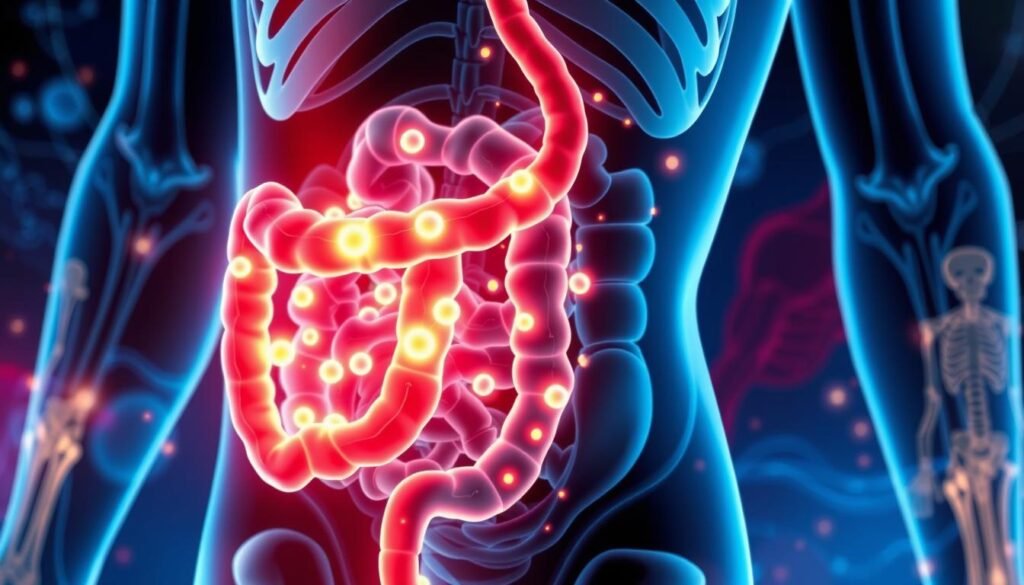Did you know that over 95% of our body’s calcium is in our bones? This fact highlights how important calcium is for keeping bones strong and muscles healthy, especially when you’re building muscle. When aiming to bulk up, knowing about calcium’s role is key. Calcium not only helps muscles move correctly but also keeps bones dense. This can stop problems like osteoporosis, which becomes a risk as people get older. Let’s dive into how calcium helps us grow stronger during training.
Key Takeaways
- Over 95% of the body’s calcium is stored in the skeleton, highlighting its importance for bone health.
- Calcium is essential for muscle contractions, making it critical during bulking phases.
- Osteoporosis affects 1 in 2 women and 1 in 4 men, emphasizing the need for sufficient calcium intake.
- Adequate calcium along with higher protein intake improves bone mineral density.
- Understanding the interplay between calcium and vitamin D is crucial for optimal absorption and utilization.
Introduction to Calcium’s Role in the Body
Calcium is a crucial mineral that helps with many body functions. More than 99% of the body’s calcium is in our bones and teeth. It’s found mainly as hydroxyapatite, making bones strong and giving structure.
This shows why calcium is so important. It not only keeps bones tough but is also key in other bodily functions.
Calcium does more than just help with bone health. It helps with blood vessel movement, sending nerve signals, and muscle work. Hormones like parathyroid hormone (PTH) and vitamin D manage calcium in our bodies. This complex system shows calcium’s vital role beyond bone health.
As we get older, knowing all about calcium’s benefits is key. Eating enough calcium keeps bones dense and helps our whole body stay healthy. It tells us we should be aware of our diet and take steps to stay healthy.
How Calcium Supports Bone Health and Muscle Strength
Calcium is key in keeping us healthy, focusing on bones and muscles. Learning about this mineral shows how it aids our bodies.
The Importance of Calcium for Bone Density
Calcium’s role in bone strength is crucial. Our bones store calcium and give our bodies structure.
Getting enough calcium helps bones renew, which keeps them strong. Without enough calcium, bones can get weak, raising osteoporosis risk.
Calcium’s Role in Muscle Function and Contraction
Calcium doesn’t just help bones; it’s vital for muscles too. It starts muscle contraction by interacting with proteins when nerves signal muscles.
This interaction is a key step for muscles to move properly. Thus, calcium links muscle work to bone health, highlighting its overall importance.
Calcium Benefits for Muscle Strength During Bulk Phases
During bulking phases, getting enough calcium is key. It helps increase muscle strength and enhance performance. With enough calcium, muscle contractions improve. This means better lifting and stronger results in strength training.
Enhancing Performance Through Adequate Calcium Intake
Calcium plays a big part in how muscles work. It helps them contract when you’re lifting heavy in the gym. Keeping calcium levels up means better muscle contractions and top performance during workouts. Studies have found that lots of calcium can improve your lifting and stamina.
Calcium and Recovery: Why It Matters
Recovering well after tough workouts is key for growing stronger muscles. Calcium is important here because it helps nerves work properly and repair muscles. Research shows that the right amount of calcium can speed up recovery. This means less tiredness and soreness, so you’re ready to go again sooner.
| Calcium Benefits | Impact on Muscle Strength and Recovery |
|---|---|
| Enhanced Muscle Contraction | Improves lifting efficiency and performance during workouts |
| Supports Nerve Function | Facilitates communication between nerves and muscles, aiding recovery |
| Improves Recovery Rates | Minimizes muscle soreness and fatigue after strenuous activities |
| Promotes Bone Health | Strengthens skeletal support, vital for heavy lifting |
Bone Health: The Interplay Between Calcium and Vitamin D
Bone health needs both calcium and vitamin D. They don’t work alone but together. They make sure our bodies can keep bones strong. Vitamin D is key because it boosts how much calcium our intestines can take in. Without enough vitamin D, our bodies can’t get the calcium we need. This can make our bones weak and raise the risk of osteoporosis.
The Synergistic Effect of Vitamin D and Calcium
Calcium and vitamin D together are vital for keeping bones healthy. Vitamin D helps the gut absorb calcium. This makes sure the calcium we eat actually strengthens our bones. It’s important to eat enough of both to meet dietary needs. Kids aged 9 to 18 need 1,300 mg of calcium daily, and adults aged 19 to 50 need 1,000 mg.
Vitamin D Deficiency and Its Impact on Calcium Absorption
A lack of vitamin D can mean not enough calcium gets absorbed. This is bad for bone strength. Adults should get 400 to 800 IU of vitamin D each day. As we get older, it’s even more crucial to keep up with calcium and vitamin D. People over 51 should get 800 to 1,000 IU of vitamin D. Keeping these nutrients balanced helps prevent weak bones and osteoporosis. For more details, check out this study on the importance of calcium and vitamin.

Dietary Calcium Sources and Their Importance
Strong bones and good health need enough dietary calcium. Different foods have lots of calcium, crucial for people of all ages. Eating calcium-rich foods helps keep bones strong and muscles working right.
Calcium-Rich Foods for Optimal Bone Health
For the needed 700 mg of calcium daily, there are many foods to eat. Dairy like milk, yogurt, and cheese have lots of calcium. But, non-dairy foods are also key, especially for those who can’t have dairy or prefer not to. Non-dairy options include:
- Leafy green vegetables, like kale and broccoli
- Legumes such as chickpeas and beans
- Calcium-set tofu and fortified plant-based milks
- Seeds and nuts, especially sesame seeds
Eating these foods helps meet calcium needs, keeping bones and muscles in good shape. For more details, nutritional resources offer extra help on getting enough calcium.
Fortified Foods and Calcium Supplements
Fortified foods help a lot with calcium intake, especially for vegans. Items like fortified soy, rice, and oat drinks, breakfast cereals, and fat spreads add extra calcium. For those who can’t get enough calcium from food, supplements are a good option. Available supplements include:
| Supplement Type | Elemental Calcium (% in Supplement) |
|---|---|
| Calcium Carbonate | 40% |
| Calcium Citrate | 21% |
| Calcium Lactate | 13% |
| Calcium Gluconate | 9% |
Taking calcium supplements might cause stomach upset for some. It’s wise to talk to a doctor before starting supplements, to choose the best one and avoid deficiency risks.
Calcium Absorption: How It Works
Getting enough calcium is key for strong bones and muscles. Different factors affecting absorption play a role. These determine how well our bodies use calcium from our food. Most of the absorption happens in the intestines. Here, vitamin D helps control the process.
Factors Affecting Calcium Absorption
Many things can change how well calcium is absorbed, such as:
- Age: As people get older, they might not absorb calcium as well.
- Dietary composition: Eating foods with magnesium and vitamin D helps with calcium absorption.
- Food matrices: The type of calcium matters too; dairy products have a 30% absorption rate, while leafy greens like bok choy can go up to 50%.
- Presence of certain nutrients: Eating too much salt can cause more calcium to be lost in urine. Some medicines can also change absorption levels.
The Role of Diet in Maximizing Calcium Uptake
Eating the right foods is crucial for getting enough calcium. Yogurt, mozzarella cheese, and tofu are great choices. Adults need between 1,000 mg and 1,200 mg of calcium daily, based on their age and gender. Mixing a variety of these foods with enough vitamin D boosts calcium uptake.
To find out more about keeping muscles strong with good nutrition, read this article on preventing muscle atrophy.
Knowing how this works shows why eating well is important to avoid osteoporosis. This disease makes bones weak, and it affects many women over 50. Paying attention to how much calcium you get can have big health benefits.

Calcium Deficiency and Its Effects on Health
Calcium deficiency is a serious issue for overall health. It’s important to keep enough calcium in our bodies. This is because it affects bone strength and health. Spotting the signs of not having enough calcium is key to taking action early.
Identifying Signs of Calcium Deficiency
It’s crucial to know the symptoms of not having enough calcium. This can prevent major health issues. Common signs are:
- Muscle cramps and spasms
- Numbness or tingling in fingers and toes
- Weak or brittle nails
- Fatigue and weakness
- Unexplained pain in the bones
- Stooped posture, which may signal early osteoporosis
Knowing these signs helps in dealing with low calcium levels quickly. This can stop worse health problems later on.
Long-Term Consequences: Osteoporosis and More
If you don’t have enough calcium for a long time, it can cause serious problems. Osteoporosis is the main issue. It makes your bones weak and more likely to break. Other health issues can happen too, such as:
- Being more likely to get hurt because bones are weaker
- More anxiety and mental health issues from constant pain
- Muscle function problems because calcium’s role is messed up
Getting the right amount of calcium is super important. It helps keep bones strong and impacts your overall health. Checking your calcium levels and changing your diet when needed is key. This helps avoid bad health effects from not having enough calcium.
Integrating Calcium into Your Bulk Diet
Adding calcium to your bulk diet is key for strong muscles and bones. It’s important to get enough calcium from your diet. Eating foods high in calcium and having snacks rich in it helps keep your nutrition balanced. Here are some useful tips to make sure you’re getting enough calcium in your meals.
Practical Tips for Increasing Calcium Intake
- Choose fortified cereals for breakfast. They often contain added calcium, which can significantly contribute to daily intake.
- Incorporate dairy products such as yogurt, cheese, and milk into meals and snacks. For example, an eight-ounce serving of milk provides about 25% of the daily value of calcium.
- Include green leafy vegetables like kale and broccoli, which are good sources of calcium.
- Opt for snacks that contain calcium, such as cheese sticks or almond butter, adding nutrition while satisfying hunger.
- Consider adding tofu or soy products to stir-fries, as these are also rich in calcium.
Sample Meal Plan for Calcium-Rich Nutrition
A sample meal plan helps you meet your calcium needs while on a bulk diet.
| Meal | Food Item | Calcium Content (mg) |
|---|---|---|
| Breakfast | Fortified cereal with milk | 300 |
| Snack | Greek yogurt with almonds | 250 |
| Lunch | Spinach salad with feta cheese | 200 |
| Snack | Cottage cheese with fruit | 150 |
| Dinner | Stir-fried tofu with broccoli | 400 |

This meal plan gives you more than 1,500 mg of calcium each day. That’s above what most people need. You can change it based on what you like to eat. This ensures that you get enough calcium and nutrition for your bulking phase.
Research and Studies on Calcium’s Impact
Many studies show the big effect of calcium on muscles and bones. Knowing how important calcium is helps us improve our health and physical abilities.
Recent Findings on Calcium and Muscle Strength
Research tells us calcium is key for muscle work. If we don’t get enough, our muscles won’t perform well, which raises injury risks. This tells us calcium is super important for those who exercise a lot. To get more calcium, try mineral water. It’s good for muscle recovery and performance, especially when building muscle. Check out more about this by visiting this resource.
The Latest Insights on Calcium and Bone Density
Recent findings shed light on how calcium affects bone health. Keeping up with calcium helps stop bone density loss that comes with getting older. Also, getting enough calcium in younger years is crucial for healthy bones later on. Eating and drinking calcium-rich things is great for keeping bones strong and reducing the risk of osteoporosis. For more, look into these research studies.
| Study Focus | Key Findings |
|---|---|
| Calcium and Muscle Performance | Inadequate intake linked to reduced muscle function. |
| Calcium and Bone Density | Consistent calcium levels preserve bone density. |
| Calcium Supplements | Possible protective effects against certain fractures. |
| Dietary Calcium Sources | Mineral water and food provide vital calcium levels. |
Conclusion
Calcium plays a vital role in keeping our bones strong and muscles powerful, especially during times of muscle growth. It’s important to get enough calcium to keep our bodies healthy and able to reach fitness goals. Without enough calcium, our health could suffer.
It’s also key to know how calcium works with other nutrients, like vitamin D. Together, they help our bodies absorb calcium better. This makes our bones stronger and our muscles bigger. Knowing the dangers of not having enough calcium helps us make good choices in what we eat.
When we focus on calcium in our meals, we help our health. Add exercises that make you bear weight and eat a balanced diet to make your bones and muscles even stronger. Check out this link for information on how protein and other nutrients affect our bones and muscles. For anyone wanting to improve their health, understanding calcium’s role is essential.